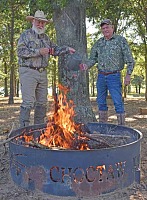Outdoor Life
Time to move education from the farm
 By Jim Powers
By Jim Powers
This email address is being protected from spambots. You need JavaScript enabled to view it.
A personal failing that I must acknowledge frequently is that lost causes follow me home like sad little puppies. I’m so attracted to them that I continue to adopt them even though doing so once came precariously close to getting me killed.
Never one to be deterred by something as clarifying as a near death experience, I’m going to wade into the long running debate of the best way to structure the public-school year. The 21st Century debate centers around the four-day school week, but the discussion has been going on for decades.
My bona fides for discussing education don’t stem from any personal experience as a teacher. I have a very short tolerance for children (we didn’t have children, so please don’t call CPS), so a career in education would have been very short lived. My experience with schools is even stronger…I married a teacher.
When my wife and I married, she was teaching second grade and would teach elementary age children her entire career. I learned two things very quickly by marrying a teacher. First, a small-town teacher in 1978 made shockingly little money. Secondly, teachers worked very long workdays.
In the mid 1980s, the discussion about changes to the school year centered for a time on year around school, and the school she was teaching at was chosen by the district to test the idea. Instructional time was structured as six-weeks in class and one week off. The thinking was that the frequent week longs breaks would result in better educational outcomes because the students and teachers would be fresher after that weeklong break.
At the end of a year, the results were exactly as predicted. Students’ scores were up, and teachers were much happier with the arrangement. Exactly the outcome educators were hoping for. So, of course, the district immediately adopted year-round school? Well, no.
Related Articles
While the students were happy and did better, and the teachers were happy (less stress buildup), the parents hated it. Their complaints? Because day care is expensive, and parents depended on the school to act as free daycare so they could work, that week off every six weeks was unacceptable. The second reason was that the kids not having the summer months off conflicted with their vacation plans each year. When it came time to decide on continuing the program, there was such an uprising from the parents, even though their children were doing better in school, that the district killed the project.
The 2022 analog to the 1980’s year-round school is the four-day school week. Shepherd ISD in San Jacinto County is one school that has adopted a four-day school week. Teachers are likely more enthusiastic with the concept than parents. And I’m sure the district has worked to resolve these issues.
But a primary concern of Shepherd ISD is not just educational advantages, but a practical one. Fed up with the obstacles to teaching students teachers face every day, many teachers have left the field.
My wife often complained that if they didn’t have to do so much administrative stuff (paperwork), they could spend a lot more time working with the kids. In fact, the state passed a “paperwork reduction” act for educators around that time. Which, of course, only increased the amount of paperwork they had to do.
Faced with the difficulty hiring experienced teachers, Shepherd ISD appears to successfully be using the shorter workweek as an incentive for hiring teachers. Hopefully, shorter, more focused school weeks will result in positive benefits for both students and teachers.
The primary obstacle for school districts, in my experience, to innovation in educational approaches, is tradition. Few of our students need the summer off to work in the fields on the family farm. In fact, even in the 1950s and 1960s, when I was in public school, the first few weeks of summer vacation were great, and then we were just bored, and looked forward to school starting again. Taking even a couple of months off at a time sets students back and requires wasted time with reteaching at the beginning of the school year.
While I personally think year-round school is the better alternative, the four-day school week is a start to moving away from an educational system mired in an agrarian culture that no longer exists.
You are a guest
or post as a guest
Be the first to comment.



